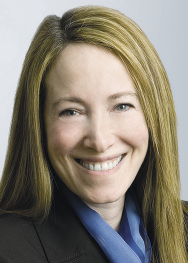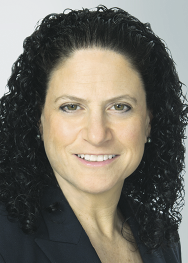- Home
- Media Kit
- Current Issue
- Past Issues
- Ad Specs-Submission
- Ad Print Settings
- Reprints (PDF)
- Photo Specifications (PDF)
- Contact Us

![]()
ONLINE

Practice Driven

Elise M. Bloom
Elise Bloom is a member of Proskauer’s Executive Committee and the immediate past co-Chair of the Labor & Employment Law Department. Bloom was named “Best in Labor & Employment” at Euromoney’s 2014 Americas Women in Business Law Awards and has served as Senior Editor of the CCH Journal of Employment Discrimination.

Andrea S. Rattner
Andrea Rattner is a member of the firm’s Executive Committee and the immediate past Chair of the Tax Department. She practices in the field of employee benefits and executive compensation law, counseling clients with respect to the tax, securities, corporate governance, stock exchange, ERISA, and other implications of executive compensation arrangements and employee benefit plans. She also counsels clients on benefits and compensation matters arising in corporate transactions, including mergers & acquisitions, restructurings, debt and equity offerings, and bankruptcies. Since 1993, she has served as an adjunct professor on the faculty of Cornell University’s School of Industrial & Labor Relations.
Firm Brief
Founded in 1875, Proskauer (proskauer.com) is a global law firm providing a broad and sophisticated range of legal services to clients worldwide from 13 offices in the Americas, Europe, and Asia. The firm has experience in all areas of practice important to businesses, including corporate finance, mergers and acquisitions, private equity, real estate transactions, bankruptcy and reorganization, taxation, litigation, trusts and estates, intellectual property, and labor and employment law. Its clients include participants in many industries, including chemicals, entertainment, financial services, healthcare, hospitality, technology, insurance, manufacturing, media and communications, pharmaceuticals, real estate investment, sports, and transportation.
How have your careers evolved and which areas do you lead today?
Bloom: I graduated from law school in 1982 and joined Proskauer in 2006. My goals were to work on large class-action labor and employment cases and to lead a department. Within two years of joining the firm, I became the co-Chair of both the Class and Collective Actions Practice Group and the Labor and Employment Law Department. While my practice benefitted from the Proskauer name and platform, the firm also gave me the opportunity to be a leader and run a department. It empowered me to take my vision for managing a practice and move it forward.
If you had asked me when I first got out of law school where I hoped my career would take me, this is it, although I never would have believed that I would have achieved so many of my goals at this stage of my career.
Rattner: I feel exactly the same way. I am very fortunate to be here. In my case, I basically grew up at Proskauer.
Over the years, many people at the firm were extremely supportive of me, which was wonderful. I didn’t have just one mentor; rather, a whole series of people served as my mentors and were influential in my development as a lawyer and as a person.
Throughout my career, my primary focus has always been on serving our clients and developing the knowledge and skills necessary to be regarded as a trusted advisor. In addition, I spent a lot of time getting involved in Bar Association and other activities. In the case of the New York City Bar Association, I began as Secretary of the Employee Benefits Committee; a decade and a half later, I became Chair of that committee.
Growing up at the firm, I saw that being a successful partner requires you to be fully engaged in all aspects of the firm as an institution, from recruiting to teaching and mentoring younger lawyers.
What is the secret to the firm’s success?
Bloom: Working together to help our clients find a way to yes. The first thing that struck me when I came here was how collaborative and collegial the lawyers are.
There is a big focus on knowledge and knowledge sharing, but the real difference is that lawyers here really work together as a group. It’s not unusual for us to send an e-mail or go into someone’s office and ask, I have this situation, what do you think?
People here love what they do and share that enthusiasm with other lawyers in the firm, and it results in much more strategic and creative thinking for our clients.
People keep up-to-date not just on the newest legal developments, but we read about our clients and their businesses to learn about them and we share that information with each other in shaping our legal strategy.
Also, the firm is truly practice driven – our practice groups are not just a marketing tool; rather, they are very well steeped in the law, as well as in the different businesses we serve. We leverage our practice groups to provide superior service to clients.
There is a big focus on
knowledge and knowledge sharing, but the real difference is that lawyers here really work
together as a group.
Are the blue chip companies and large clients the core for the firm?
Bloom: It’s part of it, but I have a pretty good mix of very large clients and cases, and I have some really small clients. We can deliver really good value to those very small clients following the same philosophy: Learn about your client’s business, learn what is important to your client, and be able to take what you know about the law and marry that with the client’s objectives.
Rattner: We have a very rich and varied client base. It’s not simply a short list of a few financial institutions. We have large blue-chip corporate clients, financial institutions, private equity sponsors, and publicly traded companies, and we touch a varied range of business sectors where we deliver top quality legal and business advice. It’s not just about being a great lawyer who knows the law; it’s also about understanding the business. Our clients’ industries include sports, healthcare, private investment funds, REITs and real estate, hospitality, telecommunications, technology, and many others.
We collaborate internally but also with our clients, so we do a lot with this industry focus as part of the way that lawyers grow and develop here.
When talking about size, what may be large in a particular sector like finance may look different than in another sector. It’s not just a roster of exclusively large companies – it’s an array.
Also, within the different industries, we represent the established players as well as the innovative newcomers. For example, in financial services, we have focused on alternative sources of capital since their inception, while also representing many of the bulge bracket banks.
Is it harder to find the client time when you’re managing your people?
Rattner: It’s critical for law firm leaders to keep their fingers on the pulse of their clients.
While it is possible to leverage oneself and build teams, it is very important to maintain an intense client focus.
Naturally, there is always a little rejiggering in terms of time spent doing management versus time spent dealing with the client work, but we both have done it. Success requires a significant time commitment, dedication, and focus, but it can be done.
When I was Chair of the Tax Department, I didn’t see the role as a top-down type of position. I viewed myself as a facilitator helping the department’s lawyers achieve their goals to benefit their own personal careers, as well as for the good of the practice and the firm. This collaborative approach naturally resulted in getting other people involved in the department’s practice, operations, and management.
It’s the same thing with the practice of law. No one stands alone – it’s about working collaboratively with others to deliver the greatest possible value to our clients.
Bloom: From my perspective, what it takes is extremely good organizational skills.
Without the client work, I do not think I would be as good a manager. One of the things I added to the labor department was my ability to help lawyers in the department capitalize on their strengths. I hope the growth and development of the next generation of the Proskauer Labor and Employment Law Department will be viewed as one of my significant contributions.
For me, it also is about communication. If I have a trial, I communicate to my department and firm leadership, and work out an alternative plan to address the management side in order to manage deadlines and commitments to everyone’s satisfaction. Our bench strength substantively and administratively has enabled me to be a successful manager and effective lawyer to the firm’s clients.
Being a successful partner
requires you to be fully engaged in all aspects of the firm as an institution.
How critical is it that diversity is mirrored within your firm to understand your diverse client needs?
Bloom: The more differences you have among people, the greater the possibility that you’re going to have different ideas, and the more ideas that you have, the better the solutions you can deliver to the firm’s client.
From where I sit, the more diverse the group, the greater the opportunity to achieve the best result.
Rattner: I also think the expectation of clients now is that they want to see diverse lawyers. Beyond the fact that it’s the right thing to do, diversity gives rise to a better result by adding new insight and perspectives.
Would you also talk about the emphasis your firm places on pro bono?
Rattner: The firm has a longstanding commitment to pro bono and community service generally. Giving back is considered to be part of each lawyer’s obligation.
We have a very robust pro bono program and an administrative team dedicated to establishing opportunities for people. While lawyers often bring their own ideas to the table, we try to make it easier by offering an array of opportunities.
Our lawyers sometimes use the pro bono program as an opportunity to focus on a project or issue that is near and dear to them; other times they use it as an opportunity to develop a skill set that they may not necessarily be able to develop in the normal course of work; and still others pick pro bono projects that complement their existing skill sets and strengths.
Our robust program is designed to give people choice and the opportunity to figure out how they can best fulfill their pro bono commitment.•